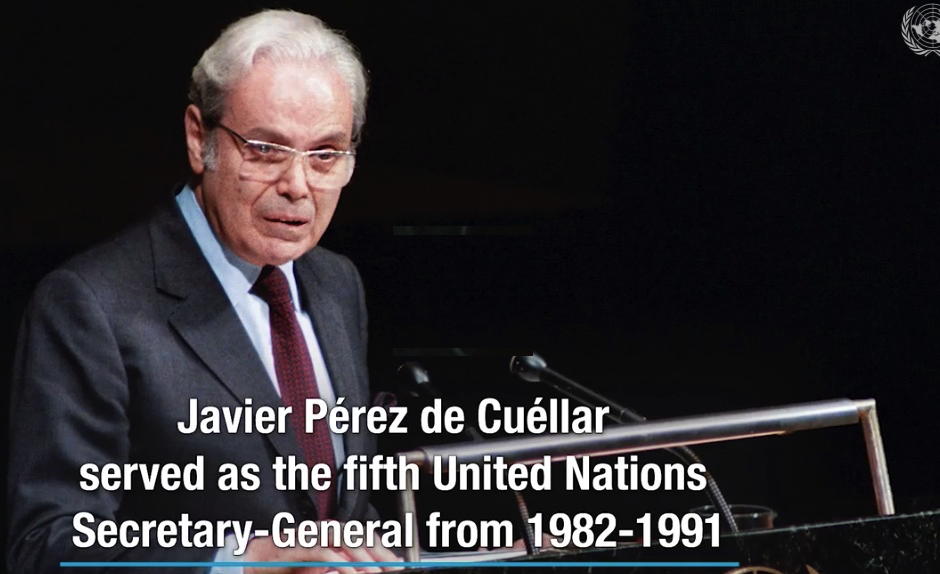FREE FLOW OF INFORMATION
A blog by Federico Mayor (translation by CPNN)
Javier Pérez de Cuéllar, former Secretary General of the United Nations (1982-1991), architect, among many other important achievements, of the peace processes in Mozambique, with the Community of Sant’Egidio, that of El Salvador and restart Guatemala. In the last two, I participated actively, following his guidelines as Director-General of UNESCO (1987-1999). His serenity and measure were always accompanied by great firmness and decisive action, with great logistical capacity. He was very demanding in the exercise of democratic multilateralism. He believed in the value and strength of the word, of the encounter, of the outstretched hand.

Javier Pérez de Cuéllar
Working with him was a very sobering experience. His clear vision, his conviction that the solution lies in the encounter, in the dialogue, in the mediation and conciliation constitute a luminous legacy that could clarify many challenges, some potentially irreversible, that confront humanity today.
We are in “… times of doubts and resignations in which noise drowns out words”, as Miquel Martí i Pol so beautifully wrote in 1981 (in “L’ámbit de tots el ámbits)”). As Secretary-General, Javier Pérez de Cuéllar was committed equally to freedom of expression and non-violence, but now the voices of the United Nations and its Institutions have been silenced. Now, more than ever – as between Calvino and Castellio – the principle of the word must be defended against the sword. Silencing “the voice of the world” goes against humanity’s interests, encouraging frustration, exclusion, radicalization.
Tireless on the path of reconciliation and concord, his life followed the common thread of his principles. From his time as Secretary-General, it is important to highlight how he made the orgaization effective, which is not easy given its complexity and the historical moment in which he carried out his responsibility with special dedication and a vision for the future. Despite the achievements made, “the majority of humanity still lives in conditions of poverty … and human excesses threaten the environment on which we all depend … There will be conflicts in the world until human aspirations can be more fully satisfied …”, he writes in the introduction to his book “Pilgrimage for Peace”, published in New York in 1997.
His reflections on the Economic and Social Council (ECOSOC) and the Security Council, relations with the United States and the role of NGOs and civil society could help today to redirect global governance, which is now irresponsibly placed in the hands of plutocratic groups. In the face of deadly invasions based on lies occur, the United Nations System is marginalized and outbreaks of xenophobia, supremacy and racism proliferate, refugee reception is neglected and development cooperation is reduced to shameful minimums.
At the ECOSOC meeting of 7 July 1988 in Geneva on international economic and social policy, I had an opportunity to directly appreciate his unusual ability as the Secretary-General. I participated in the debate with the participation of the United States, the Administrator of UNDP, Greece representing the European Economic Community, the United Kingdom, Germany, Tunisia (on behalf of the Group of 77), Canada, the Executive Director of UNICEF , China, Soviet Union …
(continued in the column on the right)
(Click here for the original Spanish.)
Where in the world can we find good leadership today?
(continued from the column on the left)
Before assuming the United Nations General Secretariat, he had already achieved great successes, such as the one he achieved in 1974 when, as the UN Commissioner, he was able to broker an agreement in Cyprus between the Greek and Turkish leaders.
Javier Pérez de Cuéllar, has left us but he remains, as in the verse by Miguel Hernández, who also became invisible on a fateful day, but is always with us: “I’m leaving, I’m leaving, I’m leaving, but I’m staying… ”
In October 1987, he received the Prince of Asturias Award “for promoting Ibero-American cooperation.” In February 1989, the Nehru Prize “for international understanding”.
On January 19, 2000, I participated in Lima, with the “Discourse on Order”, in the tribute paid to the universities of Lima and Salamanca on their eightieth birthday. In these last twenty years, we have been in constant contact and have supported multiple initiatives in favor of multilateralism.
I end with a verse I dedicated to him in 1989:
“We must all build
in a place that is
in the middle of nowhere,
on the brink of the abyss.
Outside the borders
of the prosperous lands,
in the unknown swamps.
(No, you are not unknown,
the ignored swamps
where our past
sinks
progressively,
each day
before eyes that are
indifferent
and distant,
of the helpless
who cannot,
who don’t know,
of the well-to-do
who don’t hear,
who do not want to …).
To preserve memory,
the footprints of men,
their paths past,
to clarify
their steps tomorrow
we must, my children,
my friends,
you whom I do not know,
we must build everything
next to the abyss,
in the place,
rough and unique,
of our future,
and create only wealth
that can be shared”.
People with such a long journey and unusual attitude leave an imperishable mark. One day, they are absent and they become invisible, but what matters most remains: citizens of the world, continue to illuminate the paths of tomorrow and set new directions for future generations.